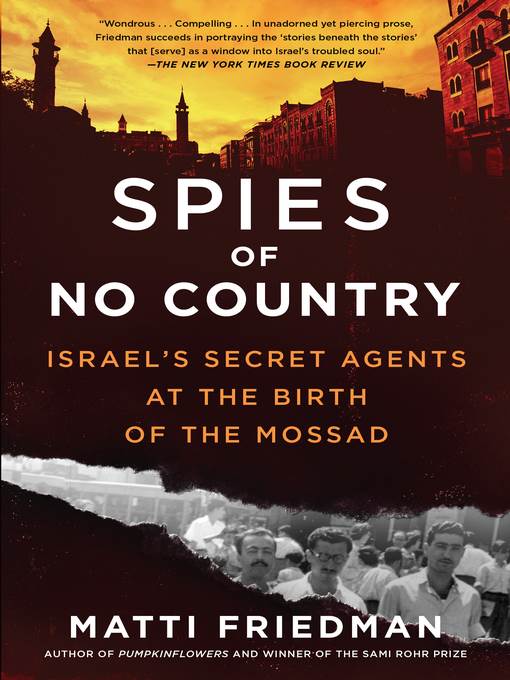
Spies of No Country
Israel's Secret Agents at the Birth of the Mossad
کتاب های مرتبط
- اطلاعات
- نقد و بررسی
- دیدگاه کاربران
نقد و بررسی

January 1, 2019
A focused espionage tale of the beginning of Israel and the spies who "turned out to be...the embryo of one of the world's most formidable intelligence services."In his latest book, former AP correspondent Friedman (Pumpkinflowers: A Soldier's Story of a Forgotten War, 2016, etc.), whose reporting has taken him to many parts of the Middle East, writes primarily about Arab Jews from the Islamic world who left their countries because they were persecuted and harassed. Unfortunately, in Israel, they were condescended to, ignored, and pushed to the fringes, believed not to be a real part of Israel. "The Israeli identity is increasingly Middle Eastern," writes the author, "but the old languages and mannerisms are gone, as the Zionist movement always intended." Friedman tells the fascinating story of the Arab Section, part of the Palmach, the Jewish underground army before there was a Jewish state. These men were from the Islamic world, thus easing their task to infiltrate it. Friedman focuses on four specific spies, all under the age of 25--Gamliel Cohen (from Damascus), Isaac Shoshan (Aleppa), Havakuk Cohen (Yemen), and Yakuba Cohen (Jerusalem, British Palestine)--who served as the link between the amateurish, small-scale beginning of Zionist intelligence, when Israel was a wish and not yet a fact, and the more professional efforts after 1948. The Palmach had very little money; the spies contrived their own cover stories, and equipment and communications were sketchy at best. At that time, Israel was many things, and the author deftly navigates the complicated identities and the stories beneath the stories. (One of his sources is the only remaining spy, Shoshan. As Friedman readily admits at the beginning of the book, this is not a comprehensive history of the birth of Israel--and it can't be, since records are few, confusion was the norm, mistakes were made, and many died.An exciting historical journey and highly informative look at the Middle East with Israel as the starting point.
COPYRIGHT(2019) Kirkus Reviews, ALL RIGHTS RESERVED.

February 1, 2019
Friedman (former Associated Press correspondent;$SPACE$Pumpkinflowers) uses his award-winning storytelling skills to examine the spy network used by the British military and the Jewish militia in Palestine during World War II and afterward. Specifically, Friedman focuses on four members of this group, known as the Arab Section, to tell this true tale. These men, codenamed Yussef, Abdul Karim, Ibrahim, and Jamil, were tasked with intelligence gathering, sabotage, and assassination. Each of them was Jewish and born in the Arab World, which made it easier for them to assume their Arab identities. The main story line begins in 1948 when they were set up at a newsstand in Beirut and passed along vital information back to Israel. Some of the men in the Arab Section were discovered and caught. Others lived through these events to share their incredible accounts. The Arab Section was so successful that it led to the creation of Israel's powerful Mossad intelligence agency. VERDICT Readers interested in the creation of Israel, the lives of spies who assisted in that endeavor, and stories of intrigue will enjoy this tremendously.--Jason L. Steagall, formerly with Gateway Technical Coll. Lib., Elkhorn, WI
Copyright 2019 Library Journal, LLC Used with permission.

Starred review from February 1, 2019
Friedman, a former Associated Press foreign correspondent who has filed stories from Israel, Lebanon, Morocco, Moscow, the Caucasus, and Washington, D.C., starts this absolutely arresting account of espionage at the genesis of the Israeli state by giving one of his reporting rules: time spent with old spies is never time wasted. This is a story that largely grew out of Friedman's meetings with one surviving spy, Isaac Shoshan, now 93, who gave Friedman a look into his work with three other Jewish spies in the Arab Section, a very fluid spy ring loosely formed by British intelligence during WWII and that later morphed into Israel's intelligence agency, Mossad. During 20 months between January 1948 and August 1949, in an extremely daring, seat-of-the-pants way, these four spies?sometimes in Haifa and sometimes in Beirut?took on Arab identities in order to collect intelligence for what was about to become Israel. (For example, they transmitted messages on a radio that resembled a clothesline.) The fact that the creation of the Israeli state was a dream, not a reality, as Friedman reminds us, is the chief tension behind the four spies' work. This tension is enhanced by Friedman's tales of double-crosses and shifting tactics. Friedman's previous book, Pumpkinflowers (2016), was a Booklist Editors' Choice and a New York Times Notable Book.(Reprinted with permission of Booklist, copyright 2019, American Library Association.)

























دیدگاه کاربران